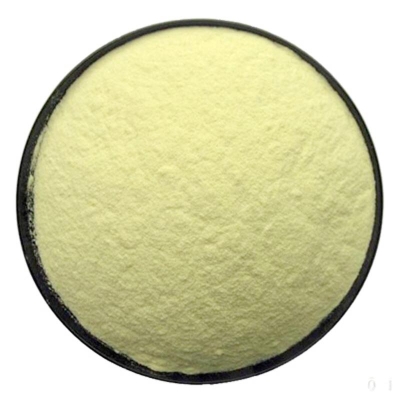-
Categories
-
Pharmaceutical Intermediates
-
Active Pharmaceutical Ingredients
-
Food Additives
- Industrial Coatings
- Agrochemicals
- Dyes and Pigments
- Surfactant
- Flavors and Fragrances
- Chemical Reagents
- Catalyst and Auxiliary
- Natural Products
- Inorganic Chemistry
-
Organic Chemistry
-
Biochemical Engineering
- Analytical Chemistry
- Cosmetic Ingredient
-
Pharmaceutical Intermediates
Promotion
ECHEMI Mall
Wholesale
Weekly Price
Exhibition
News
-
Trade Service
Inflammatory bowel disease (IBD) is an idiopathic inflammatory disease of the gut, mainly Crohn's disease and ulcerative colitis (UC).
In recent years, the incidence of the disease has risen rapidly, with its global incidence exceeding 0.
3%.
In addition to genetic factors, environmental factors play a key role in the pathogenesis of IBD, most environmental factors mainly mediate the pathogenesis of IBD by affecting the intestinal flora, such as long-term intake of the Western diet will disrupt the balance of intestinal flora, reduce the diversity of flora, intestinal flora and its metabolites stimulate the activation of innate immune cells, causing the occurrence of intestinal inflammatory reactions, thereby damaging the intestinal epithelial barrier, leading to bacterial translocation, and further stimulating the occurrence of inflammatory responses, accelerating the occurrence and development of IBD
。
Lactiplantibacillus plantarum is one of the probiotics listed in the "List of Edible Strains" of the Ministry of Health, which is widely used in the intervention research of intestinal inflammation, which can adhere to the intestinal mucosa and survive for several days, and is a good carrier
for expressing bioactive substances.
Therefore, in this experiment, Lactobacillus plantarum was selected as the carrier to construct a recombinant strain, and the secretion of hBD3 direct homologous β-defensin 14 (mBD14) was driven by Usp45 secretion signal to achieve targeted delivery
of mBD14 in mouse colons.
Xiaopei Chen, Haizhi Tian, Jia Sun*, etc.
from the School of Food Science, Jiangnan University, aimed to reveal the role and potential mechanism of recombinant Lactobacillus plantarum expressing mBD14 in dextran sodium sulfate (DSS)-induced colitis in mice, evaluate the role of probiotics and antimicrobial peptides in UC, and provide new strategies
for IBD prevention and treatment.
1.
mBD14 production bacteria L.
Construction of plantarum/mBD14 and expression of mBD14
In this experiment, Usp45 was selected as the secretion signaling peptide, which can promote their secretion to the extracellular
when Usp45 is linked to foreign protein sequences or peptides.
The Usp45-Linker-mBD14 fusion gene was encased by restriction enzymes and embedded in the SphI and XbaI sites of the pNZ8148 plasmid to obtain the plasmid pNZ8148-mBD14, and the plasmid was electrically transferred into the competent cells of Lactobacillus plantarum to obtain L.
plantarum/mBD14 (Figure 1A).
Coating MRS solid medium containing chloramphenicol (mass concentration 5 μg/L) with bacterial fluid, and the single colony obtained after culture is a positive transformon (Figure 1B).
A single colony was selected, the plasmid was extracted after culture, and the expression of mBD14 gene fragments was detected by PCR, and an amplified band of about 382 bp in size was visible, which was consistent with the PCR results of the puncture bacterial plasmid containing fusion genes (Figure 1C).
At the same time, Western blot and bacteriostatic circle experiments showed that L.
plantarum/mBD14 can express and secrete mBD14 protein, and mBD14 protein does not affect the growth of its carrier Lactobacillus plantarum (Figures 1D, E).
2.
Alleviating effect of L.
plantarum/mBD14 on colitis symptoms in mice
After 7 d of treatment with DSS, mice in the DSS group without bacterial pretreatment were observed to have a significant decrease in body mass (Figure 2A) and a significant increase in DAI score (Figure 2B)
compared to the Control group.
Colon shortening is also one of the key pathological events in
mouse colitis models.
After dissecting all mice, the length of their colons was measured, and it was found that the colons of the mice in the DSS group became significantly shorter, which further proved that the mouse colitis model was successfully
established.
Before inducing colitis, mice are administered L.
plantarum, L.
plantarum/0, and L.
Compared with the DSS group, L.
plantarum/mBD14 was able to significantly improve body mass reduction (P<0.
05), reduce DAI score and alleviate colonic shortening, while ingestion of L.
plantarum/mBD14 significantly improved body mass reduction (P0.
05), while ingestion of L.
plantarum/mBD14 significantly improved body mass reduction (P0.
05), while ingestion of L.
plantarum/mBD14 significantly improved body mass reduction (P0.
05), while ingestion of L.
plantarum/mBD14 significantly improved body mass reduction (P0.
05), while ingestion of L.
plantarum/mBD plantarum and L.
The plantarum/0 mice showed no significant difference in DAI score and colon length compared to the DSS group mice (Figure 2B, C).
<b13> Experimental results show that L.
plantarum/mBD14 relieved DSS-induced colitis without significant protection from
the two control strains.
3.
Regulatory effect of L.
plantarum/mBD14 on intestinal flora of colitis mice
The results are shown in Figure 3, after DSS treatment, the relative abundance of colonic pathogenic bacteria Escherichia coli, Fusobacterium nucleobacter and Staphylococcus aureus increased significantly (P<0.
001, P<0.
05, P<0.
01), and the relative abundance of the next-generation probiotic Ackermanella mucophilus decreased significantly (P<0.
05), which was consistent<b10> with the changes in patients with IBD in clinical practice 。 Compared with the DSS group, the relative abundance of Ackermanella mucophila in the colon of mice in the L.
plantarum/mBD14 pretreatment group increased significantly (P<0.
05), while the relative abundance of Escherichia coli, Fusobacterium nucleobacter and Staphylococcus aureus showed a significant decrease trend (P<0.
001, P<0.
05, P<0.
01), and their relative abundances were close to those in the Control group.
plantarum and L.
The plantarum/0 pretreatment significantly inhibited the increase of Escherichia coli and Fusobacterium nucleatum (P<0.
001, P<0.
05).
<b11> This experiment showed that L.
plantarum/mBD14 can significantly inhibit the enrichment of multiple pathogenic bacteria induced by DSS, and maintain the balance
of intestinal flora in the colon of mice.
4.
Protective effect of L.
plantarum/mBD14 on intestinal injury in colitis mice
Histopathological analysis of mouse colon tissue by H&E staining showed that the DSS group showed severe colonic tissue damage, its crypt structure disappeared significantly, the edema around the colon tissue, immune cell infiltration, and the histopathological scores of DSS-treated mice were significantly higher than those in the Control group (P<0.
001).
<b10> 。 By L.
The colon tissue sections of plantarum/mBD14 pretreated mice showed significant improvement, with reduced colon morphological changes and inflammatory infiltrates (Figure 4A) and the lowest histological score among all treated groups ingested with DSS (Figure 4B).
In addition, studies have shown that DSS-induced colitis will cause damage to the intestinal barrier function, and increase intestinal permeability and down-regulation of tight junction protein expression
.
The intestinal permeability
of mice was assessed by measuring the mass concentration of FITC-Dextran in mouse serum.
As shown in Figure 4C, the mass concentration of FITC-Dextran in serum of mice in the DSS group was significantly higher (P<0.
05) compared with the Control group, and L.
Compared with the DSS group, the mass concentration of FITC-Destran in the plantarum/mBD14 pretreatment group was significantly lower (P<0.
05), indicating that L.
plantarum/mBD14 maintains intestinal integrity, making FITC-Dextran unable to penetrate into the bloodstream<b10>.
Tight junction proteins play a key role in maintaining intestinal barrier function, and L.
is further validated by Western blot detection of tight junction proteins (ZO-2, Occludin, and Claudin-1).
Protective effect
of plantarum/mBD14 on intestinal barrier function.
As shown in Figure 4D, L.
plantarum/mBD14 was able to significantly increase the expression of tight junction protein (P<0.
05) compared to the DSS group, while the other two control strains did not show a significant effect<b10>.
In summary, L.
plantarum/mBD14 pretreatment can improve the DSS-induced intestinal barrier
.
5.
Immunomodulatory effect of L.
plantarum/mBD14 on colitis mice
\
The expression of pro-inflammatory cytokines Il1b, Il6, Il12, Il17a and Il18 genes in the colon was detected by qPCR, and the results showed in Figure 5, and the gene expression levels of these pro-inflammatory cytokines were significantly increased in the DSS group mice (P<0.
001).
<b10> And L.
The plantarum/mBD14 pretreatment significantly reduced the expression of pro-inflammatory cytokines (P<0.
01, P<0.
001).
<b11> At the same time Il17a and Il18 in L.
plantarum and L.
The expression of plantarum/0 pretreatment group was also significantly lowered (P<0.
05, P<0.
01).
<b12> The overexpression of Il18 and Il1b plays an important role in the pathogenesis of IBD, and significant changes
in Il18 and Il1b have been detected at the mRNA level.
Studies have shown that in acute colitis in IBD patients and mice, NLRP3 is activated, forming an inflammasome complex with the linker molecules ASC and Caspase-1, leading to the activation of Caspase-1, promoting the cleavage of pro-IL-1β and pro-IL-18 to form active IL-1β and IL-18
。 Western blot detection showed that the protein expression of IL-18 and IL-1β after intracolonic cleavage in the DSS group was significantly increased (P<0.
01), while L.
The pretreatment of plantarum/mBD14 significantly inhibited the protein expression of IL-18 and IL-1β after cleavage (P<0.
01), and further detected the expression of NLRP3 inflammasomes in the upstream pathway.
plantarum/mBD14 significantly inhibited the protein expression of NLRP3 and its downstream ASCs and Caspase-1 (P<0.
01, P<0.
05), while L.
plantarum or L.
None of plantarum/0 produced inhibition (Figure 5F).
<b15>
In summary, L.
plantarum/mBD14 inhibits the activation of DSS-induced NLRP3 inflammasomes and downstream inflammatory pathways, reduces the secretion of IL-1β and IL-18, and thereby alleviates colonic inflammation
.
Conclusion
In this experiment, a recombinant strain with Usp45 secretion sequence was constructed, namely Lactobacillus plantarum expressing mBD14.plantarum/mBD14, which enables targeted delivery
of mBD14 in the gut.
With L.
plantarum/mBD14 pretreated DSS-induced colitis mice, which significantly alleviated colitis symptoms
.
At the same time, L.
plantarum/mBD14 can regulate the intestinal flora, maintain the integrity of the intestinal barrier, reduce the expression of pro-inflammatory factors, inhibit the activation of NLRP3 inflammasomes and downstream inflammatory pathways, and thereby reduce the inflammatory response
.
This strategy can promote the clinical use
of probiotics and antimicrobial peptides for IBD.
Expert profiles
Prof.
Jia Sun, PhD supervisor, School of Food Science
, Jiangnan University.
Winner of National Outstanding Youth Fund, National Overseas High-level Talent, Winner of Jiangsu Outstanding Youth Fund, Leading Talent of Jiangsu Province Entrepreneurship and Innovation Team, Talent
of Jiangsu Province Entrepreneurship and Innovation Program.
He is the associate editor of the journals Frontiers in Immunology and Frontiers in Nutrition, a youth communication expert in Engineering in the journal of the Chinese Academy of Engineering, and an editorial board member of
Molecular Nutrition & Food Research.
Professor Sun Jia has participated in and presided over 6 projects of the National Natural Science Foundation of China such as major research projects (cultivation projects), more than 10 scientific research and talent projects at or above the provincial and ministerial level such as the Natural Science Foundation of Jiangsu Province and the "Double Innovation and Innovation Program" of Jiangsu Province, and presided over the China-Singapore Exchange Program of the Ministry of Science and Technology and the high-end foreign expert projects
of the State Administration of Foreign Experts Affairs as the person in charge of the Chinese side 。 In Immunity (cover article), Gastroenterology, EMBO Molecular Medicine (cover article), Allergy (2), British Journal of Pharmacology (3), Theranostics, BMC Medicine, FASEB Journal (2), Acta Pharmacologica Authoritative journals such as Sinica (3 articles, 1 cover article), Molecular Nutrition & Food Research and other authoritative journals have published one or communication SCI papers
.
A series of studies have found that butyric acid, a metabolite of intestinal flora, can promote the expression of antibacterial peptide CRAMP in islet β cells, maintain pancreatic immune homeostasis and endocrine health, which is the first time to clarify the mechanism of intestinal flora immune regulation of islets through the entero-pancreatic axis.
And systematically analyze the dietary components that promote the immune health of intestinal flora and pancreatic bacteria
, such as Clostridium butyric and structure-specific prebiotics.
Relevant work has been positively cited and evaluated by Nature, Nature Reviews Immunology, Nature Review Microbiology, Immunity and other international top journals, Faculty 1000 selected as recommended articles, the National Natural Science Foundation of China made fund news reports on related achievements, and domestic and foreign mainstream academic media (Science Daily, Bioscience, etc.
) commented as important scientific discoveries
。 He served as chair of the first Gordon Research Seminar-Antimicrobial Peptides (California
, USA).
This article "Lactobacillus plantarum expressing murine β-defensin 14 alleviates acute colitis in mice" is derived from Food Science, Vol.
43, No.
17, pp.
1-11, 2022, authors: Chen Xiaopei, Tian Haizhi, Ren Zhengnan, Pan Lilong, Sun Jia
.
DOI:10.
7506/spkx1002-6630-20220509-110
。 Click below to read the original article to view information about
the article.







